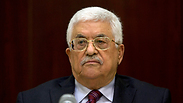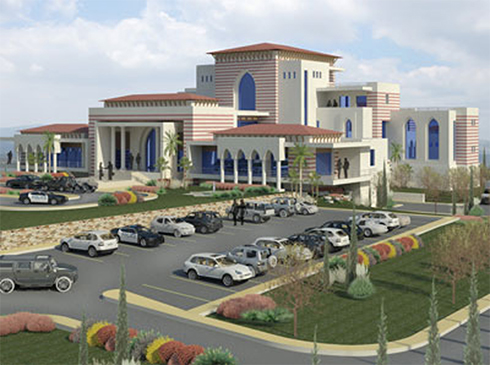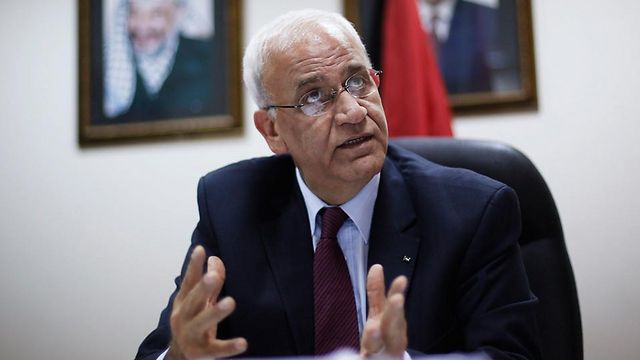
Abbas leaving? A journey among the people
PA President Mahmoud Abbas plans to leave two of his important political positions. Is this really a sign that the long-time Palestinian leader is headed for retirement? And what do the Palestinian people actually think of this?
We stopped at Mr. Baker’s shawarma in Ramallah, next to the Al Bustan candy shop. We started walking down the street that goes out from the Mukataa, which turns into Port Saeed St. a bit later, which then leads to Al Ittihad St., and eventually spills into the Manara intersection.
We parked in an illegal spot, but a policeman politely asked us to move the car. We went around the block once, twice, and then found ourselves double-parked next to Mr. Baker and Abdallah Dragmah, who sat on a plastic chair in front of the restaurant.
He’s a friend of the owner, 48 years old, a father of five, a resident of Tubas in the northern West Bank, unemployed for the past five years. He had a little insurance business, but shut it down because clients left. “People didn’t have money for those luxuries,” he says.
It’s a busy street in the city’s traffic-heavy center. On Monday, two days before our arrival, Palestinian National Authority (PNA) President Mahmoud Abbas dropped a bomb when he announced that he would not be running for reelection to the PLO leadership in the next election, which will take place in a week and a half, when Israel is celebrating Rosh Hashanah.
But the unemployed Dragmah is indifferent to the move. “Politics doesn’t interest me,” he says. “It doesn’t interest the public at large. We’re tired of these games. 22 years have passed since the Oslo accords were signed and nothing is happening.
"Life is hard here," continues Dragmah. "Our government only knows how to take our taxes and charge us for any simple bureaucratic procedure. The Jews don’t give us anything. To get here from my home, I need to pass five checkpoints. Instead of an hour’s drive, it takes nearly two. I don’t know who to blame anymore. Abbas says he’s going, and I say let’s see. Who it’ll help and why, I don’t know. Unemployment is high for us, people like me can’t make a decent living anymore. My children help me. There are a lot of young people here who graduate from college and have nothing to do. There’s no optimism here."
A tale of three roles
Our Abbas-statement-inspired journey began in Ramallah and ended in East Jerusalem. We Israelis don’t have a great understanding of internal Palestinian politics, but it doesn’t take an expert to see the big picture.
Abbas currently holds three positions. His resignation as chairman of the Palestine Liberation Organization (PLO), and his non-running for the leadership of Fatah (his political party) will leave him with the role of PNA president. But this move, shedding the roles he holds in internal politics, might ease his resignation from the role of president, which he has held since 2005.
Pundits are now trying to analyze Abbas’ moves. Is this another false threat of the “hold me back” type, which will end with him folding, or will he go all the way this time by naming one of his close allies as an heir and getting him elected to the PLO chairman’s position, after tiring of the status-quo with Israel which is leading nowhere? One way or another, the move’s consequences, if executed, may be far-reaching for Israelis and Palestinians both.
Abbas has been warning for some time that the diplomatic standstill would make Palestinians dismantle their national authority and drop the keys in Israel’s lap. And then, God help us. Israel would have to take responsibility for 2.5 million Palestinians who currently fall under PNA rule.
It seems like the Israelis are more nervous than the Palestinians right now. Following Abbas’s statement this week, Defense Minister Ya’alon scheduled a special meeting. Prime Minister Netanyahu said he’s willing to meet with Abbas. Israel seems to want him to stay more than the Palestinian public does.
A high-ranking Fatah member from Ramallah told us that Abbas can no longer be Israel’s gatekeeper without getting anything in return. “He sees that there’s nothing on the diplomatic horizon, and that there are no returns for the peace he helps maintain. The whole Oslo perception of security cooperation is based on an umbrella of negotiations, and without these he has nothing to do here. After the murder in Duma, Abbas did everything to stop a violent outbreak. And what does he get in return? Nothing. Israel doesn’t even see him.”
“How decisive is he this time? Two years ago he threatened to resign as well and ended up reversing himself,” we asked.
“When Abbas said then, that if negotiations don’t go forward he’ll leave his keys on the table, the Americans and Europeans pressured him to stay," he replied. "Israel pressured the world to pressure him to stay. The time that’s passed since then and the fact that nothing has changed make him understand that he’s reached the end of the road.
"What Abbas did this week is just the first step toward leaving," Dragmah continued. "Without the chairmanship of the PLO or the leadership of Fatah he’ll be able to conduct himself more easily as PNA head, because he won’t be committed to any of those bodies. He’ll put up an ultimatum that without a diplomatic horizon he’ll dismantle the PNA or leave without a known replacement. Then we’ll see Israel and the world deal with the consequences."
That’s high politics. But when we traveled the city talking to people, we encountered an almost complete lack of interest regarding these latest developments. People aren’t afraid to talk here, but prefer not to appear by name in an Israeli newspaper. It’s not so safe for them.
“People know what’s going on,” said a well-known Palestinian journalist, “but they don’t care. Palestinians care only about their own livelihood. There are those who say that during Abbas’s time in power we lost Gaza to Hamas, construction in settlements turned massive, and many West Bank Palestinians were killed by Israel. That’s why those Palestinians are just waiting for him to get up and leave. Others say that Abbas is better than nothing, because during his time the economy grew and developed. But it only did so for some people, not the whole public. In current economic circumstances no one is thinking about an intifada – people are working around the clock to put food on the table. Whether Abbas stays or leaves, it is of no consequence to the day-to-day.”
“Does it concern the public at all?” we asked.
“Maybe those who Make a living off the government. The PNA has 180,000 clerks, and that doesn’t include security forces. 40,000 more people work there. It’s a large part of the public that makes a living off Abbas’s leadership position. They don’t want him to leave because it’s unclear who’ll rise up in his place, or worse for them, the PNA might be dismantle,” he answers.
A smile from the money changer
What people in Ramallah are afraid to say, people in Eeast Jerusalem say freely. Nearly an hour’s ride separates the two, and without the traffic at the Kalandia checkpoint, it takes 20 minutes.
Blogger and social activist Nadia Harhash, a Beit Hanina resident, tell us that the Palestinian public is disappointed in Abbas at the American Colony hotel’s garden. She has friends and family in Ramallah and she visits there a lot. She claims that the disappointment in the president is great because he was thought to have great promise in his early days.
“The public is very angry at him. When Abbas rose to power, they said he was the best man for the job because he was a bureaucrat. He came in after Arafat who was a revolutionary and left behind a corrupt PNA. Abbas was seen as a pacifist, and more than that – a pragmatist – and the best man to end the corruption. But the situation in the PNA didn’t really change. The corruption stayed as it was. Fatah people rule all power positions and only close associates enjoy prosperity,” she said.
Professor Ali Qleibo of al-Quds University, a resident of Shuafat, says that the “prosperity” is actually an economic bubble, based on an illusion created by the PNA.
“Every PNA worker has a credit card, a car, and a house with a mortgage," said Qleibo. "There are coffee shops, electrical equipment and clothing stores, nice restaurants. The banks encourage people to take out loans and everybody’s indentured to them. Allegedly, you’re living well, so there’s no need to rise up. When a person needs to work all month to pay back loans to the bank he becomes a captive of the economic system, a bureaucrat.”
He continues, “There’s no longer any manpower for revolution. From a revolutionary people we’ve become a people captivated by Western consumer culture. And the ones who created this situation are the PNA leaders. They want power, money, and control, no opposition. Opposition isn’t good for the economy. They created an obedient system, a gilded cage that most of the people don’t enjoy.”
The roadside advertising in the PNA’s territories show the “prosperity” that Qleibo speaks of. The cell phone providers advertise phones and data plans on them. The Jordan Commercial Bank is advertising a loan package worth 77,000 Jordanian Dinars (about US $108,000), to be used for “a trip, a wedding, education, building a home, anything you might choose or want.” Domino’s Pizza, KFC, the Cairo-Amman Bank, restaurants, coffee shops, clothing and shoe brands, summer sales.
“Most of the people are fighting to survive,” says Qleibo, “but they can all take out loans. They’ve flooded the people with loans. It’s like a small child who’s crying and his mother gives him chocolate so he’ll sit and calm down.”
Harhash isn’t optimistic, either. “The PNA is based on the Oslo accords as a midway step before a state is formed," he said. "But in practice nothing is happening, no negotiations, no light on the horizon. This rut breeds despair. The people don’t see an end to the conflict. Checkpoints have become de facto border crossings. And it’s not that our leadership has stayed silent, it hasn’t. But where has it led us?”
“What are the Palestinian people’s political options?” we ask.
She answered, “Replacing the people in power positions. Saeb Erekat, for example, has been managing negotiations for over 20 years. He’s the only person who’s dealt with it, and although I don’t think the blame is on the Palestinian side, I don’t understand how the same person is doing this job for so many years. The fact that we haven’t replaced people or changed our practices is a central problem. Now there are those who speak of Erekat as Abbas’s preferred heir, and that’s although he’s not at all popular with the public, he doesn’t have the people’s support. But today I don’t see a figure that is accepted by all of the Palestinian public. There’s not one figure that represents the people.”
Qleibo says that he traveled to Jericho this week, to see his money changer, and was greeted with a big smile. “Have you heard the good news?” he asked him and didn’t wait for an answer, “he’s leaving.” According to the professor, “The public is tired of the current situation and yearns for change. People are saying ‘Abbas made his money,we don’t need to worry about him, he can retire in peace’.”
We ask them both if they would speak the same way if they were living in Ramallah.
Qleibo answers, “No, I’d be afraid. There’s political terror there. The people also prefer not to see the full picture because life isn’t simple there already. They prefer to hold on to the good things, even if they are few, to keep their sanity. Everyone wants to be part of the new consumer culture. The corruption is difficult, problematic, but the people have become used to it, it’s become normal to them."
As for Harhash, he says, “I see myself as Palestinian even if I don’t live in the PNA territories. I visit there a lot. I have close friends in leading Fatah positions. I’m critical and am not afraid of expressing my opinions, and no one ever threatened me. But I’m aware that people are afraid to express their opinion because they’re afraid to lose their livelihood.
"That’s what’s sad about the current situation," he adds. "Everyone knows and understands that the situation isn’t good, that there are no prospects for change, that Abbas isn’t the man to bring the change they so yearn for. But to make a living you have to be in the Fatah, and have to be loyal, acknowledge the reality and sit quietly.
"If you ask me about, say, ten years from now, what will happen, I don’t see any change. The situation will be the same, we’ll be in the same place.”












